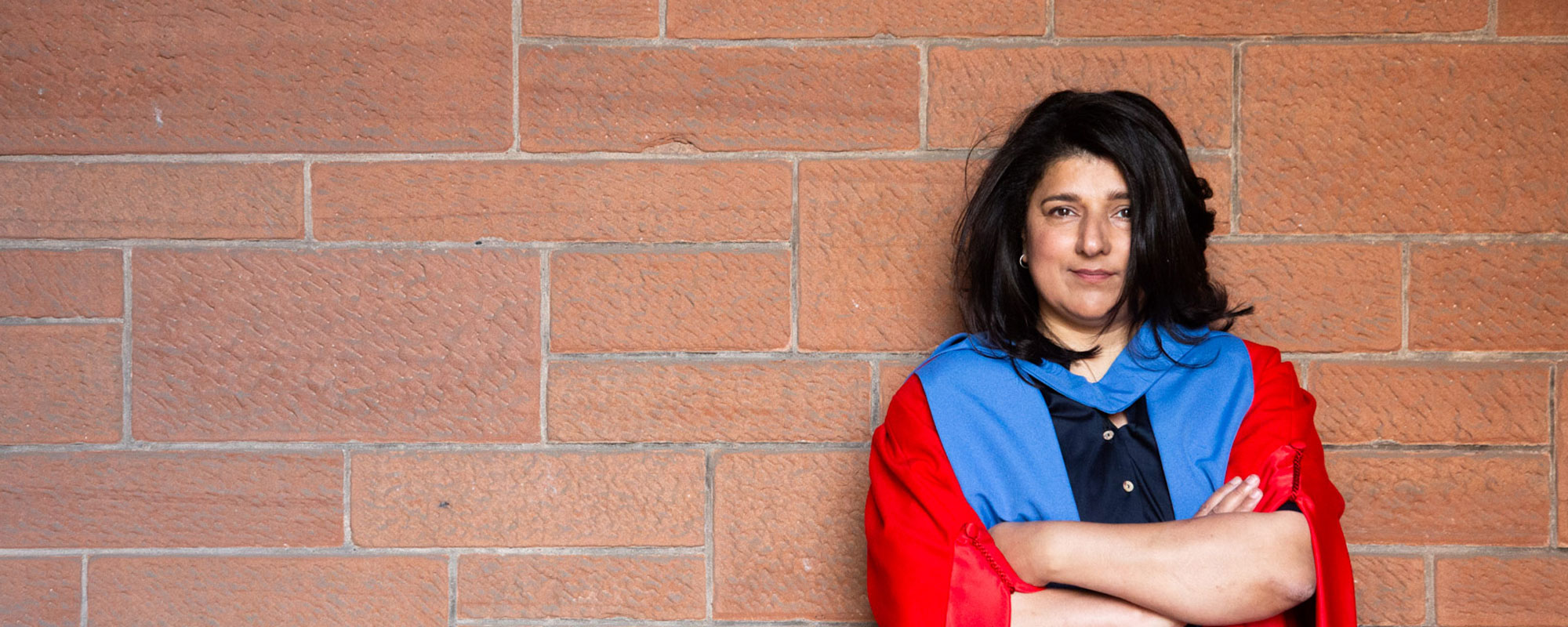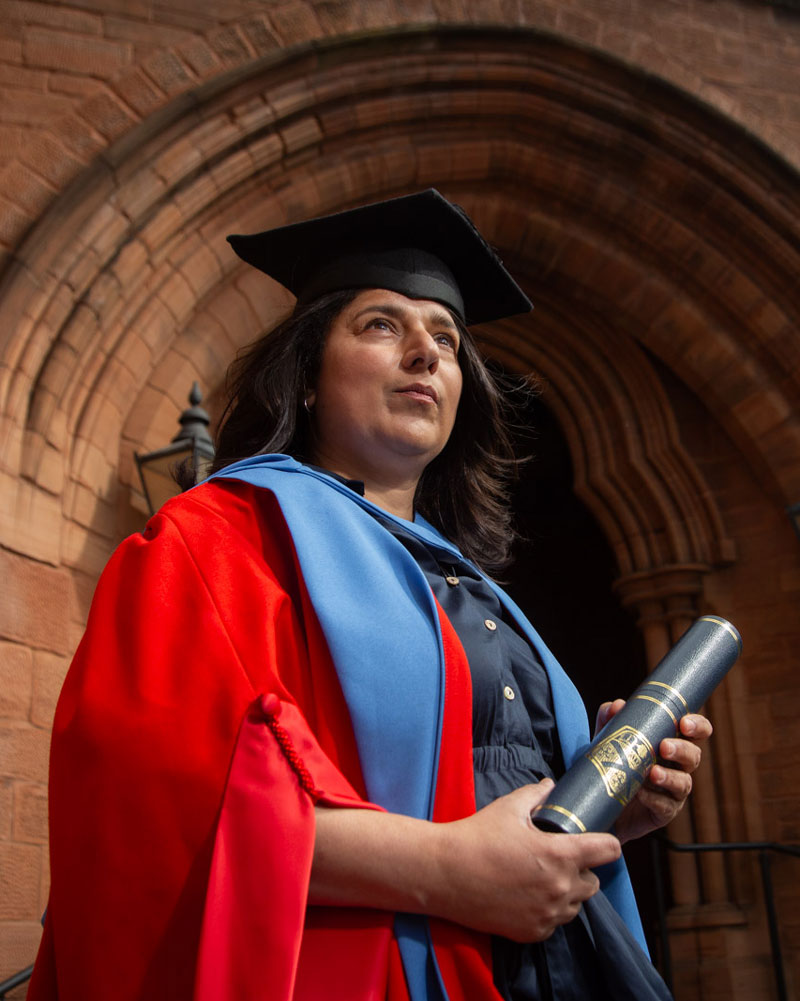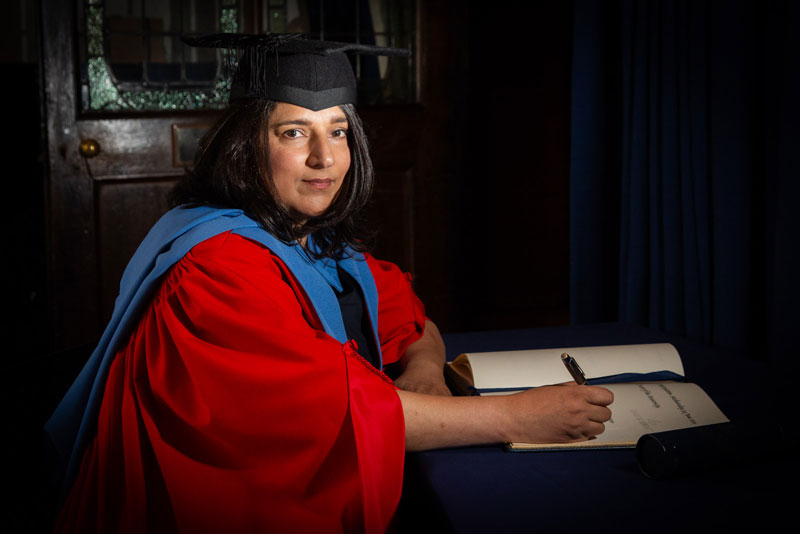
Honorary DegreesRobina Qureshi
Meet Robina
Robina Qureshi is an internationally recognsed human rights campaigner. She is the founder and CEO of Scottish charity Positive Action in Housing, and has dedicated 30 years to anti-racism and human rights work.
A Strong Voice
Starting out in 1986, Robina trained in welfare rights to support the unemployed. By 1989, she was helping Black and Asian communities in Glasgow with housing and welfare issues. Working with community activists, she encouraged local people to become shareholders of the local housing association, resulting in Scotland’s first predominantly ethnic minority-led committee.

After this, Robina began working with social housing providers in Glasgow, and in 1992, she was recruited by the Scottish Federation of Housing Associations to lead a unit dedicated to tackling race and housing issues.
By the mid-90s, alongside other founding members, she had established Positive Action in Housing, which quickly gained a reputation for strong anti-racism campaigns and speaking out against racism and discrimination in the housing sector. This then led to increased housing opportunities for those in the Black and Minority Ethnic communities who were in greatest need.
Tireless campaigning
Robina has led significant efforts throughout the years, including, but not limited to:
- securing £8 million in funding for ethnic minority housing needs in 1996, leading to the creation of new homes and sheltered housing projects in Glasgow
- tirelessly campaigning against the mistreatment and poor living conditions of asylum seekers
- campaigning for and succeeding in the release of 13-year-old Meltem Avcil and her mother after their incarceration, in 2002
- establishing a refugee hosting network (Room for Refugees) in 2003 with over 20,000 members in response to the growing number of homeless refugees in need of shelter, which went viral in 2015 with the Syrian refugee crisis. The network went on to house hundreds of refugees from Syria, Iraq, Iran, Yemen, and Afghanistan, providing a safety net for unaccompanied asylum seekers, women with children, and potential victims of trafficking
- fighting against dawn raids on asylum seekers' Glasgow homes between 2005 and 2007
- successfully lobbying for NHS support for Afghan baby Sudais Asif who suffered severe facial disfigurement and lost his entire family in a gas explosion in Peshawar, Pakistan
- led campaigns against the eviction of asylum seekers by Serco in 2018
- led the campaign to host Ukrainian refugees in 2022 due to the Ukraine war which was followed by the UK government setting up Homes for Ukraine. The charity provided homes for over 1100 families
- raised more than £30,000 in days to evacuate nine Palestinians in Gaza earlier this year (2024)
Helping thousands
Today, the Room for Refugees Network has accommodated more than 5,000 men, women, and children. It's provided over 520,000 placement nights of shelter, saving the government more than £26 million in the cost of housing. Under Robina's leadership, the charity also set up an Emergency Relief Fund to distribute crisis grants of more than £1 million for food, clothing, and shelter to people in need.
Award-winning
In 2019, Robina was named in the Sunday Herald as one of Scotland's Brave Hearts, and in 2022, she received the Chartered Institute of Housing's Alan Ferguson award for outstanding contribution to housing.
Watch
Watch Robina as she delivers her speech and hear what she had to say to our students at their graduation ceremony.
We caught up with Robina ahead of receiving her Honorary Degree.
Congratulations! How do you feel about receiving your Honorary Degree from the University of Strathclyde today?

I didn't have the chance to go to university so yes, it’s kind of special. The reaction from my family, friends and colleagues has been touching. My sister sent me a text this morning from Oslo, she was emotional thinking how proud our parents would be. We grew up poor, and they struggled most of their lives to give us a life so they are uppermost in my mind. This is for them, and especially my dear mother who passed away last year.
What’s the most important life lesson you’ve learned that helped you get to where you are today?
Perseverance I guess, and never to take no for an answer. There is only the concept of winning the case you're representing or the funds you're trying to raise. Work gets quite intense when there’s a campaign or a news story goes viral, one idea fires off the next, and you have this goal, of being original with how you communicate a person's story, a story that is often mostly overlooked and ignored by the world. My job is to tell the story in a way that people will want to sit up and listen and act, to humanise the other person and their community, and tear down the stereotypes and hopefully get to make a difference for them and other people who find themselves in a similar situation too. Equally, all of this mindset is something I’ve had to learn to switch off to.
What's the best part of your work with Positive Action in Housing?
Working with some amazing people, and not taking myself too seriously. Even though the work is centred around serious human rights issues, the network of people I can turn to for answers seems infinite. We aren't extensions of computers; community and synergy is important. So the working from home thing has to be balanced with a busy vibrant work environment separate from home life.
My team has a mixture of ages and it’s inspiring to see younger people learning their trade fresh out of university and older staff members passing on their knowledge and wisdom and learning new ways of doing things too. My trustees have put their trust in me, something I take very seriously, they are incredibly supportive, especially when there are valuable lessons to be learned. And they are there because they believe in the cause, not because of the positions they occupy.
Alongside the public-facing aspect of my work, there's also the pressures of running a charity. Right now, I'm involved in establishing robust systems to help this vital work continue. It's exciting but I feel a little sad too as this stage of my career is about stepping back. But I will never truly retire. Nor do I want to be clinging on for dear life. Life goes on.
What's your favourite spot in Glasgow?
Well, from my office windows I can see over the top of the Tron Church, Nelson Mandela Place, Buchanan Street, George Square and then onto Glasgow’s east end. Towards evening when the sun is setting the view is beautiful or even when there’s a storm or hailstones and you see people down below running for cover. When I first started here the street was quite genteel and conservative. There were several banks housed in stunning buildings steeped in history, and shops that sold exquisite fountain pens, books on business and management, and even pipes. They have all gone, replaced by eateries and consumer culture. It’s life moving on, but I miss that time. The other place I like for occasional morning meetings is upstairs at the back of Little Italy in Byres Road which has been around since the 90s. The staff are great and the coffee is perfect everytime.
What do you like to do in your spare time?
These days, because of what’s happening in Palestine, and knowing people who have family in Gaza, it’s hard to relax. I enjoy spending time with my family and close friends. We are incredibly private. On weekends it’s nice to put on music while making dinner. Leonard Cohen’s final album, I Want It Darker, is a masterpiece. Craig Armstrong’s music is stunning. My daughter loves Billie Eilish and I do too. Both my son and daughter have an exquisite taste in music. Patti Smith’s Hard Rain, which she sang at Dylan’s Nobel Peace Prize award ceremony, is heart-rending especially when she forgets the words and how she handles it. As I've gotten older, I really want quiet and peace. And I love sleep. I can’t get enough sleep!
What advice do you have for our graduates?
Don’t be silent when your voice could make a difference. No job or social acceptance is worth it. The Universe is unfolding as it’s meant to, so acceptance is key to getting peace in your life. There's also an intriguing line from Kung Fu Panda, a movie my daughter watched constantly when she was little, but it’s actually from a 17th-century French poet, Jean de la Fontaine: "one often meets one’s destiny on the road one takes to avoid it". I'm not sure if that’s advice, but it's definitely something to think about.